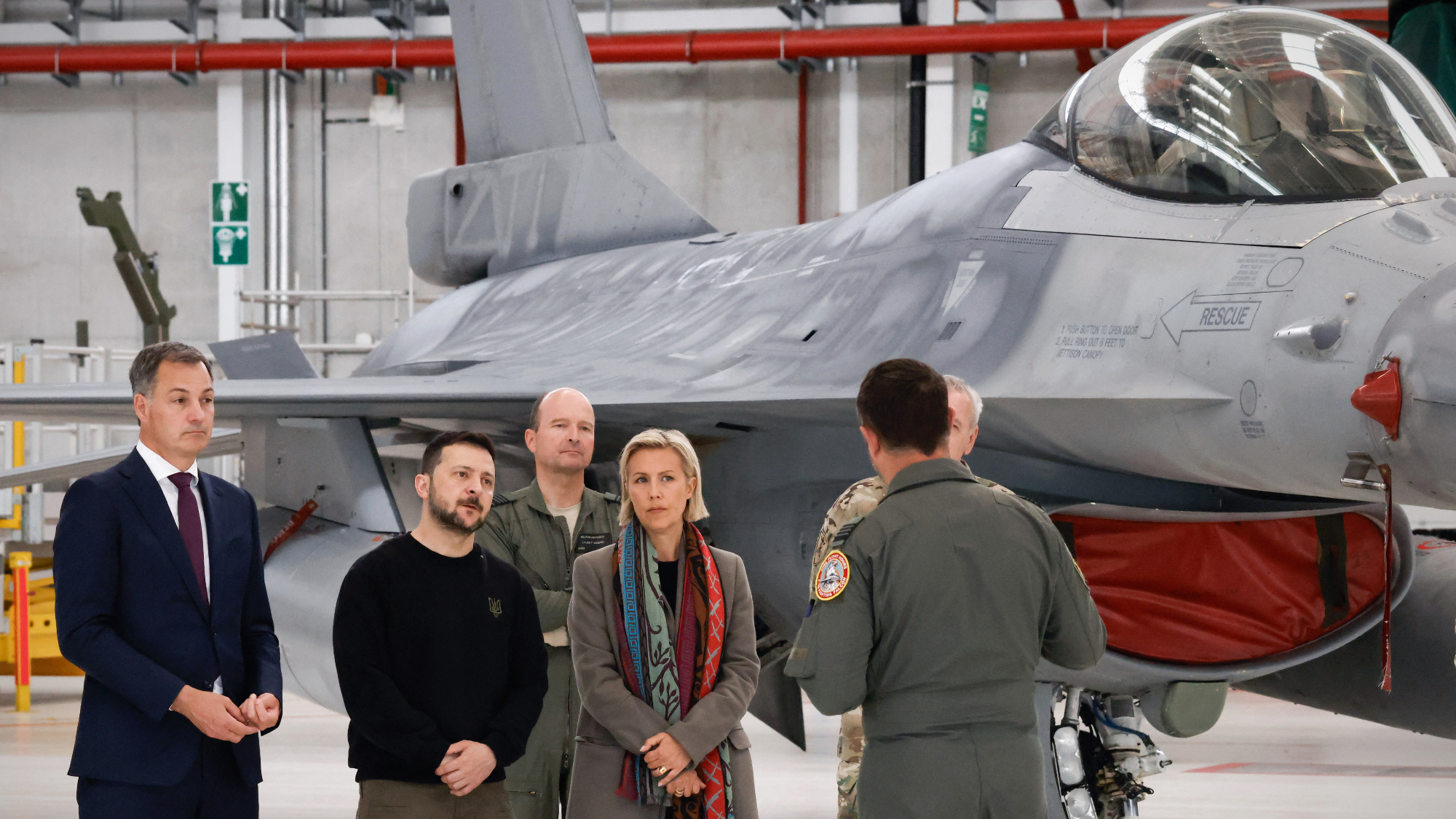Ukraine's F-16 fighter jets to fly 'this summer'
Warplanes sent by the U.S. and other NATO allies will help combat Russian forces


A free daily email with the biggest news stories of the day – and the best features from TheWeek.com
You are now subscribed
Your newsletter sign-up was successful
What happened
NATO members have begun sending F-16 fighter jets to Ukraine, the White House said Wednesday. The initial shipment of the American-made planes, long sought by Kyiv, are being transferred from Denmark and the Netherlands and "will be flying in the skies of Ukraine this summer," Secretary of State Antony Blinken said as NATO leaders met in Washington for a 75th anniversary summit.
Who said what
The high-tech fighter jets "bring just and lasting peace closer" and demonstrate that "terror must fail everywhere and at any time," Ukrainian President Volodymyr Zelenskyy said, thanking the NATO nations for planes.
The transfer, initially approved in May 2023, follows this week's deadly bombing of a Ukrainian children's hospital, an attack "some observers said was Russian President Vladimir Putin's message to the NATO alliance," Politico said. Conversely, The Washington Post said, the F-16 deliveries, combined with a separate announcement that powerful U.S. long-range missile systems will be deployed in Germany in 2026, "seemed designed in part to capture Russia's attention." The U.S. and its NATO allies have "steadily moved toward providing more advanced weapons to Ukraine" as its war with Russia drags into a third year, The Wall Street Journal said.
What next?
Kyiv anticipates fielding at least "60 F-16s eventually," the Post said, "with a host of nations banding together to provide pilot training, weapons and logistical support."
The Week
Escape your echo chamber. Get the facts behind the news, plus analysis from multiple perspectives.

Sign up for The Week's Free Newsletters
From our morning news briefing to a weekly Good News Newsletter, get the best of The Week delivered directly to your inbox.
From our morning news briefing to a weekly Good News Newsletter, get the best of The Week delivered directly to your inbox.
A free daily email with the biggest news stories of the day – and the best features from TheWeek.com
Rafi Schwartz has worked as a politics writer at The Week since 2022, where he covers elections, Congress and the White House. He was previously a contributing writer with Mic focusing largely on politics, a senior writer with Splinter News, a staff writer for Fusion's news lab, and the managing editor of Heeb Magazine, a Jewish life and culture publication. Rafi's work has appeared in Rolling Stone, GOOD and The Forward, among others.
-
 What are the best investments for beginners?
What are the best investments for beginners?The Explainer Stocks and ETFs and bonds, oh my
-
 What to know before filing your own taxes for the first time
What to know before filing your own taxes for the first timethe explainer Tackle this financial milestone with confidence
-
 The biggest box office flops of the 21st century
The biggest box office flops of the 21st centuryin depth Unnecessary remakes and turgid, expensive CGI-fests highlight this list of these most notorious box-office losers
-
 ‘The mark’s significance is psychological, if that’
‘The mark’s significance is psychological, if that’Instant Opinion Opinion, comment and editorials of the day
-
 Trump links funding to name on Penn Station
Trump links funding to name on Penn StationSpeed Read Trump “can restart the funding with a snap of his fingers,” a Schumer insider said
-
 Trump reclassifies 50,000 federal jobs to ease firings
Trump reclassifies 50,000 federal jobs to ease firingsSpeed Read The rule strips longstanding job protections from federal workers
-
 Supreme Court upholds California gerrymander
Supreme Court upholds California gerrymanderSpeed Read The emergency docket order had no dissents from the court
-
 700 ICE agents exit Twin Cities amid legal chaos
700 ICE agents exit Twin Cities amid legal chaosSpeed Read More than 2,000 agents remain in the region
-
 Trump demands $1B from Harvard, deepening feud
Trump demands $1B from Harvard, deepening feudSpeed Read Trump has continually gone after the university during his second term
-
 House ends brief shutdown, tees up ICE showdown
House ends brief shutdown, tees up ICE showdownSpeed Read Numerous Democrats joined most Republicans in voting yes
-
 Trump’s Kennedy Center closure plan draws ire
Trump’s Kennedy Center closure plan draws ireSpeed Read Trump said he will close the center for two years for ‘renovations’
